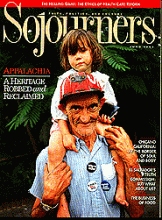When the moon was rising and the paddies,
flooded and green, the field slaves, led
by a slave preacher toting an old Bible
with missing leaves and curled pages,
took to the cypress grove where the Spirit
had free reign. After the iron pot
had been turned upside-down to sanctify
the ground and muffle sound, true believers
commenced singing, sending up prayers
on crescendoes, rounds of sorrow songs.
Testimonies, punctuated with amens,
gave way to tears and trembling, shouts.
Though they clapped and stomped
a rhythmic ritual, they denied dancing:
their feet never crossed. Their joy shook stars
from the black of night, ushered in dawn.
(In a Confederate museum in Richmond, Virginia, the poet saw an iron pot in the religious artifacts exhibit. The iron pot was put outside the places where slaves gathered secretly for worship to muffle the sounds of their prayers.)
Carole Boston Weatherford was a poet, essayist, and business writer when this poem appeared.
Read the Full Article
